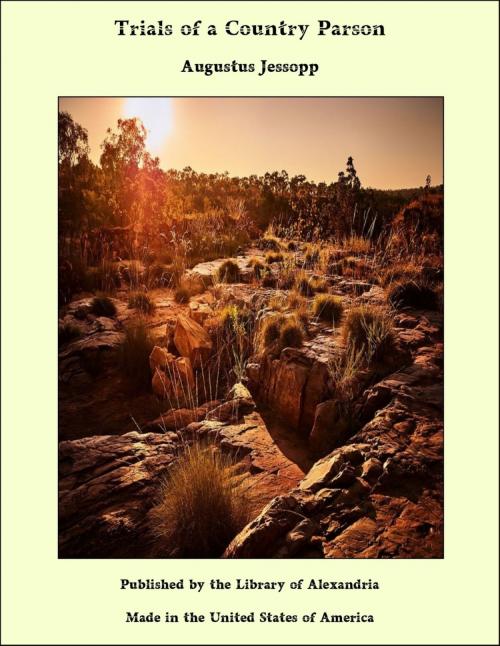Trials of a Country Parson
Nonfiction, Religion & Spirituality, New Age, History, Fiction & Literature| Author: | Augustus Jessopp | ISBN: | 9781465623867 |
| Publisher: | Library of Alexandria | Publication: | March 8, 2015 |
| Imprint: | Language: | English |
| Author: | Augustus Jessopp |
| ISBN: | 9781465623867 |
| Publisher: | Library of Alexandria |
| Publication: | March 8, 2015 |
| Imprint: | |
| Language: | English |
My friends from Babylon the great are very good to me in the summer-time. They come in a delightful stream from their thousand luxuries, their great social gatherings, their brilliant talk, and their cheering and stimulating surroundings; they come from all the excitement and the whirl of London or some other huge city where men live, and they make their friendly sojourn with us here in the wilderness even for a week at a time. They come in a generous and self-denying spirit to console and condole with the man whom they pity so gracefully—the poor country parson “relegated,” as Bishop Stubbs is pleased to express it, “to the comparative uselessness of literary (and clerical) retirement.” I observe that the first question my good friends ask is invariably this: “What shall we do and where shall we go—to-morrow?” It would be absurd to suppose that any man in his senses comes to the wilderness to staythere, or that there could be anything to do there. A man goes to a place to see, not the place itself, but some other place. When you find yourself in the wilderness you may use any spot in it as a point of departure, but as a dwelling-place, a resting-place, never! Moreover, I observe that, by the help of such means of locomotion as we have at command, the days pass merrily enough with my visitors in fine weather. But as sure as ever the rain comes, so surely do my friends receive important letters calling them back, much to their distress and disappointment. If the weather be very bad—obstinately bad—or if a horse falls lame and cannot be replaced, or some equally crushing disaster keeps us all confined to the house and garden, my visitors invariably receive a telegram which summons them home instantly even at the cost of having to send for a fly to the nearest market town. Sometimes, by a rare coincidence, a kindly being drops in upon us even in the winter. He is always genial, cordial, and a great refreshment, but he never stays a second night. We keep him warm, we allow a liberal use of “the shameful,” we give him meat and drink of the best, we flatter him, we coddle him, we talk and draw him out, we “show him things,” but he never stays over that single night; and when he goes, as he shakes our hands and wraps himself up in his rugs and furs, I notice that he has a sort of conflate expression upon his countenance; his face is as a hybrid flower where two beauties blend. One eye says plainly, “I am a lucky dog, for I am going away at last,” and the other eye, beaming with kindliness, sometimes with affection, says just as plainly, “Poor old boy, how I do pity you!”
My friends from Babylon the great are very good to me in the summer-time. They come in a delightful stream from their thousand luxuries, their great social gatherings, their brilliant talk, and their cheering and stimulating surroundings; they come from all the excitement and the whirl of London or some other huge city where men live, and they make their friendly sojourn with us here in the wilderness even for a week at a time. They come in a generous and self-denying spirit to console and condole with the man whom they pity so gracefully—the poor country parson “relegated,” as Bishop Stubbs is pleased to express it, “to the comparative uselessness of literary (and clerical) retirement.” I observe that the first question my good friends ask is invariably this: “What shall we do and where shall we go—to-morrow?” It would be absurd to suppose that any man in his senses comes to the wilderness to staythere, or that there could be anything to do there. A man goes to a place to see, not the place itself, but some other place. When you find yourself in the wilderness you may use any spot in it as a point of departure, but as a dwelling-place, a resting-place, never! Moreover, I observe that, by the help of such means of locomotion as we have at command, the days pass merrily enough with my visitors in fine weather. But as sure as ever the rain comes, so surely do my friends receive important letters calling them back, much to their distress and disappointment. If the weather be very bad—obstinately bad—or if a horse falls lame and cannot be replaced, or some equally crushing disaster keeps us all confined to the house and garden, my visitors invariably receive a telegram which summons them home instantly even at the cost of having to send for a fly to the nearest market town. Sometimes, by a rare coincidence, a kindly being drops in upon us even in the winter. He is always genial, cordial, and a great refreshment, but he never stays a second night. We keep him warm, we allow a liberal use of “the shameful,” we give him meat and drink of the best, we flatter him, we coddle him, we talk and draw him out, we “show him things,” but he never stays over that single night; and when he goes, as he shakes our hands and wraps himself up in his rugs and furs, I notice that he has a sort of conflate expression upon his countenance; his face is as a hybrid flower where two beauties blend. One eye says plainly, “I am a lucky dog, for I am going away at last,” and the other eye, beaming with kindliness, sometimes with affection, says just as plainly, “Poor old boy, how I do pity you!”















